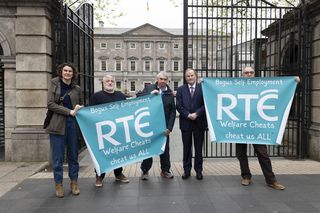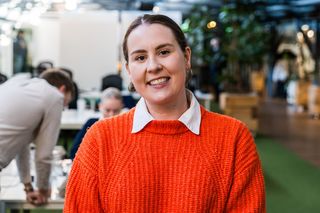Facebook takes on the cyberbullies
The world's leading social network took the action route in response to public criticism of its anti-bullying methods
Let me take a selfie: Roisin King of Newbridge College; Alex Holmes of the Diana Awards and Elliot Davis of Newbridge College Photo: Martin Maher.
As the the Managing Director of Facebook in Ireland, Sonia Flynn says she treats online bullying with the utmost seriousness.
Before she became the boss of the social network in Ireland, she worked for the site's community operations team, based in Dublin.
In recent days she invited "anti-bullying ambassadors" - second-level pupils from Ireland and Britain - to look at the site's tools for tackling online abuse and harassment.
Working in the glass tower in Grand Canal Square in what has been dubbed 'Dublin's Silicon Docks', the Facebook safety team reviews reports of abuse coming in from around the world.
There are three other international centres dealing with these reports. When one group clocks off, another team comes on duty.
Sonia Flynn says Facebook helps people who come across messages or photos that make them feel uncomfortable. These could be unflattering pictures, hateful messages and even threats.
With 1.35 billion users worldwide, Facebook receives thousands of messages in a day from users, and many of these are complaints about bullying and abuse.
A recent survey by the National Association of Principals and Deputy Principals showed 16pc of Irish second-level students have been bullied online.
In 2012 and 2013, social networking sites were criticised by the NAPD for not reacting swiftly enough to bullying messages. Other causes for complaint were abusive messages directed at teachers.
Since the uproar over cyberbullying two years ago, Facebook has created an anti-bullying hub, using researchers from Yale University.
Facebook managing director Sonia Flynn says: "We have been working on safety for quite a while. We have been figuring out better ways to address problems when they come in. We are trying to make the information about bullying on our site clearer and more intuitive.
"Whether you are a parent, a teacher or a student if you are concerned about content on Facebook, you can report it to us directly and we will respond."
She says Facebook removes any content that bullies, intimidates or harasses another user.
"We have a zero tolerance approach. Any reports coming in about younger people get our top priority.
"We would like to emphasise to parents and teachers that you don't have to be on Facebook to send information about bullying to us. We will take these reports seriously."
Facebook has also been working closely with outside groups to tighten up its policies. These include the ISPCC and the Internet safety group, Webwise.
In recent days, Facebook invited 11 of the anti-bullying ambassadors from schools across Ireland and Britain to show them how its policies work.
The ambassadors have been trained by the Diana Awards, a charity set up in memory of Princess Diana. There are now 800 anti-bullying ambassadors from the charity operating in Irish schools.
In Facebook's Dublin offices a group of these ambassadors learned how to get the best out of Facebook's reporting tools. They were also able to give feedback on how efficiently these tools work.
Elliot Davis, a 16-year-old Transition Year student, is one of 10 anti-bullying ambassadors at Newbridge College, Co. Kildare.
As he visited Facebook, he said: "The main thing that hit home for me is that when you submit a report to Facebook, there are real people responding to it and not just some robot somewhere. That is reassuring."
Like many of those offering help to his fellow pupils, Elliot was a victim of cyberbullying himself. He was trained as an anti-bullying ambassador four months ago.
He says: "If you experienced it yourself you are so much more passionate about trying to stop it. Online bullying is a growing issue and it's there all the time, because technology is the main influence on our generation.
"Looking back I wish there had been anti-bullying ambassadors in my school when it was happening to me."
At Newbridge College there is now a confidential email account where victims can pass on reports to the ambassadors and this is also monitored by teachers.
The ambassadors also wear wristbands and badges identifying themselves to other pupils so that if a student has a bullying problem, he or she has someone to whom they can talk.
Facebook is not the only site that has responded to public concerns by introducing more comprehensive anti-bullying policies. In recent days the parent company of the social networking site Ask.fm, has announced the formation of a new Safety Advisory Board to help prevent online bullying.
In 2014 the Net Children Go Mobile survey showed that 90pc of 15 to 16-year-olds in Ireland have a profile on a social networking site. The survey found that 40pc of 11 to 12-year-olds had social network profiles, even though most of the sites are restricted to those aged 13 and above.
Andrew Jackson, anti-bullying co-ordinator for the ISPCC, predicts that cyberbullying will become the most prevalent form of bullying in the near future.
"Sometimes bullies post pictures, or in some case they might set up an entire Facebook page to target a victim."
The anonymous nature of some posts on sites such as Ask.fm can be extremely damaging, according to Andrew Jackson.
"When somebody is set apart from the person they are targeting they don't really understand the consequences of their behaviour. There is a strong level of detachment and a lack of empathy."
Andrew Jackson says many sites have now upped their game when it comes to tackling the issue of bullying.
"There was a perception that social media sites were not stepping up to the plate and doing something to respond to it. Now a lot of the sites have report buttons and support pages and that is to be welcomed.
"Ask.fm are being more pro-active now in dealing with bullying and they have consulted us about it. Part of that is down to the response of the public.
He continued: "The social media sites can do a lot, but parents and children also need to become more aware about how to be safe online."
The ISPCC advises children to be extremely careful about the contacts they make online. Where bullying is persistent parents should consider taking the issue to school authorities, or in more severe cases, to gardai.
Top tips for dealing with social media abuse
What should students do if they are being bullied, harassed or attacked by someone on Facebook? Facebook offers a number of tools to help victims deal with bullying and harassment. The best protection against bullying is to learn how to recognise it and how to stop it. Here are some tips about what you should — and shouldn’t — do:
* UNFRIEND
Only your Facebook friends can contact you through Facebook chat or post messages on your Timeline
* BLOCK
This will prevent the person from starting chats and messages with you, adding you as a friend and viewing things you share on your Timeline
* REPORT
Use Facebook to report the person or any abusive things they post
* DON’T RESPOND
Typically, bullies want to get a response — don’t
give them one
* DON’T KEEP IT A SECRET
Use Facebook’s Trusted Friend tool to send a copy of the abusive content to someone you trust who can help you deal with the bullying. This will also generate a report to Facebook
* DOCUMENT AND SAVE
If the attacks persist, you may need to report the activity to an internet service provider and they will want to see the messages
Join the Irish Independent WhatsApp channel
Stay up to date with all the latest news













